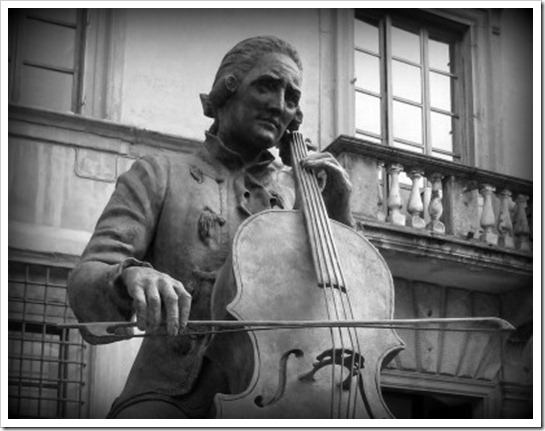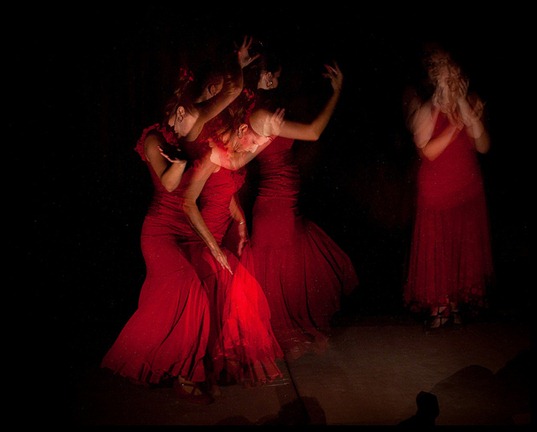Boccherini in Spain Posted by Geoff on Jul 23, 2014 in Uncategorized
One of the aspect of researching for my blogs that I really enjoy is the way that one piece of information leads to another, and a whole new world of possibilities opens up before my eyes. On Monday, for example, I was searching for information onLa Tempesta when I came across a song by Angelo Branduardi of the same name. I wasn’t crazy about the song itself, but the attractive melody seemed somehow familiar. A bit more digging revealed that it was originally penned in 1780 by the Lucchese composer Luigi Boccherini under the title Passa Calle, as part of the suite Musica Notturna delle Strade di Madrid.
 |
|
Statue of Luigi Boccherini playing his Violoncello (cello) outside the Conservatorio Luigi Boccherini in Lucca. |
So what was an 18th century composer from Lucca doing writing music about the streets of Madrid? Boccherini was born in Lucca, Tuscany, in 1743, and his father, a cellist and double bass player, sent him to study music in Rome at an early age. Later, both father and son would travel to Vienna where they were employed as court musicians at the Burgtheatre. From there, Boccherini junior moved on to Madrid, Spain, where he worked for Infante Luis Antonio, younger brother of King Charles III.
Back in those days, of course, options for making a living as an artist or musician were pretty limited, and if you didn’t want to starve it was important to find a rich patron. Very often, the only thing that those rich patrons required of their composers was ‘musical wallpaper’, and vast amounts of tedious repetitive music was churned out by some incredibly talented composers just to keep the boss happy.
It must have been tough for a composer as talented as Boccherini, and when one day the king complained about a passage in a new trio, ordering Boccherini to change it, the composer carried out the king’s orders by doubling the passage in length, and immediately getting the sack … way to go Luigi! Boccherini then accompanied Don Luis to a little town in the Gredos mountains called Arenas de San Pedro, and it was there and in the nearby town of Candeleda that he wrote many of his most beautiful pieces.
Now, everyone must surely know at least one piece by Boccherini, and it’s probably this one, played here in a version unlike anything you’ve ever heard: The Trio Elinte play Boccherini’s Minuet. But it’s also highly likely that you’ve heard Passa Calle without even knowing it, as it featured prominently in the film Master and Commander, starring Russell Crow (see video clip below).
And here’s a lovely version of the entire suite which I highly recommend you listen to: La Musica Notturna delle Strade di Madrid.
 |
|
Flamenco dancer. Photo (CC) by Flavio~ |
Finally, the missing link, the song that led me from Monday morning’s dramatic tempest to Boccherini’s little masterpiece: La Tempesta by Angelo Branduardi. Not really my ‘cup of tea’ as I’m not a fan of modern pop versions of classical music, but interesting none the less.

Build vocabulary, practice pronunciation, and more with Transparent Language Online. Available anytime, anywhere, on any device.





Comments:
Giacomo Sileo:
Cari,Serena e Goeff,
Buona sera.
Faccio una domanda per favore.
Would you use congiuntivo for this phrase:
if I drive, would you go with me? Or does the if clause have to be a totally hypothetical case?
Mi piace molto gli articoli particolarmente quando sono scritti in italiano come un brano in italiano e un brano in inglese ( la traduzione). Che cosa mai e’ successo a quelli?
Ciao da Denver
Giacomo
Geoff:
@Giacomo Sileo Ciao Giacomo, I think part of the confusion about when to use the subjunctive in Italian is directly related to its use, or misuse in English.
Take your phrase ‘if I drive, would you go with me?’ for example. There are two possible correct forms that could be used here in English:
1. If I drove, would you come with me. In this case we use the subjunctive and the conditional: ‘se guidassi io, ci verresti?’
2. If I drive, will you come with me. This uses the normal present tense: ‘se guido io, ci vieni?’
If you reread your example in English carefully you’ll see that it mixes the two together, i.e.drove should go with would, and drive should go with will. I think that this is the root of the problem.
As for your second question …. see today’s blog ‘Shelley in Italy’.
Ti saluto, Geoff
Michele Mandrioli:
I enjoyed playing some simplified Boccherini pieces in my childhood violin lessons. He is still one of my favorite composers. If you aren’t familiar with his music, a good introduction would be the very exciting Guitar quintet, No. 4 in D, G.448, “Fandango”.
https://www.youtube.com/results?search_query=boccherini+fandango
Geoff:
@Michele Mandrioli Grazie per il consiglio Michele, l’ho apena ascoltato … bellisima.
Saluti da Geoff